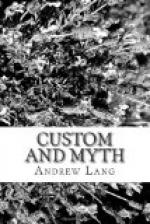whom he has got outside of, in a long and voracious
career, troop forth from him alive and well, like
the swallowed gods from the maw of Cronus. {54a}
Now, story for story, the Bushman version is much less
offensive than that of Hesiod. But the Bushman
story is just the sort of story we expect from Bushmen,
whereas the Hesiodic story is not at all the kind of
tale we look for from Greeks. The explanation
is, that the Greeks had advanced out of a savage state
of mind and society, but had retained their old myths,
myths evolved in the savage stage, and in harmony with
that condition of fancy. Among the Kaffirs {54b}
we find the same ‘swallow-myth.’
The Igongqongqo swallows all and sundry; a woman cuts
the swallower with a knife, and ‘people came
out, and cattle, and dogs.’ In Australia,
a god is swallowed. As in the myth preserved
by Aristophanes in the ‘Birds,’ the Australians
believe that birds were the original gods, and the
eagle, especially, is a great creative power.
The Moon was a mischievous being, who walked about
the world, doing what evil he could. One day
he swallowed the eagle-god. The wives of the
eagle came up, and the Moon asked them where he might
find a well. They pointed out a well, and, as
he drank, they hit the Moon with a stone tomahawk,
and out flew the eagle. {54c} This is oddly like Grimm’s
tale of ‘The Wolf and the Kids.’
The wolf swallowed the kids, their mother cut a hole
in the wolf, let out the kids, stuffed the wolf with
stones, and sewed him up again. The wolf went
to the well to drink, the weight of the stones pulled
him in, and he was drowned. Similar stories are
common among the Red Indians, and Mr. Im Thurn has
found them in Guiana. How savages all over the
world got the idea that men and beasts could be swallowed
and disgorged alive, and why they fashioned the idea
into a divine myth, it is hard to say. Mr. Tylor,
in ‘Primitive Culture,’ {55a} adds many
examples of the narrative. The Basutos have it;
it occurs some five times in Callaway’s ‘Zulu
Nursery Tales.’ In Greenland the Eskimo
have a shape of the incident, and we have all heard
of the escape of Jonah.
It has been suggested that night, covering up the world, gave the first idea of the swallowing myth. Now in some of the stories the night is obviously conceived of as a big beast which swallows all things. The notion that night is an animal is entirely in harmony with savage metaphysics. In the opinion of the savage speculator, all things are men and animals. ’Ils se persuadent que non seulement les hommes et les autres animaux, mais aussi que toutes les autres choses sont animees,’ says one of the old Jesuit missionaries in Canada. {55b} ’The wind was formerly a person; he became a bird,’ say the Bushmen.




